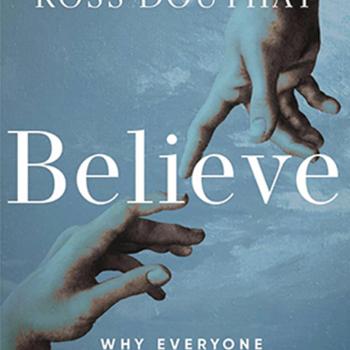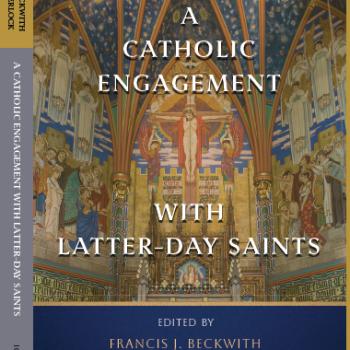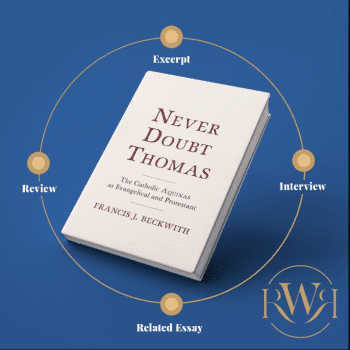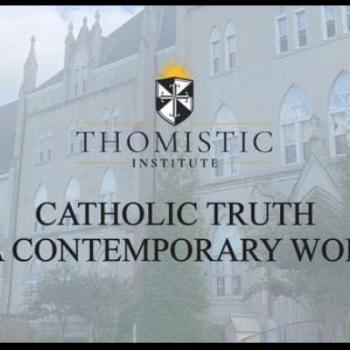On September 15, 2010, my Baylor colleague, Ralph C. Wood, gave the academic convocation address at Providence College in Providence, Rhode Island. Ralph is spending the 2010-2011 year on the Providence faculty as the Rev. Robert J. Randall Distinguished Professor of Christian Culture. A couple of nights ago he emailed to me a copy of his September 15 address. While I sat reading Ralph’s talk in the Starbucks at the Barnes & Noble in Waco, I found myself emotionally gripped by Ralph’s powerful words. Although I am neither a Baptist nor from the South, I seemed to know the roads he traveled and the characters he encountered, though for me they had different faces and names and reside in different places. Here are some excerpts:
The second most crucial religious event beyond my baptism also occurred during my undergraduate years. Prospective Baptist preachers who were serious about their vocation wanted to be educated at Baylor University. I was one of them, and I yearned for “Jerusalem on the Brazos,” there in the heart of Texas, at the school that was the veritable buckle on the Bible Belt. Yet in 1959, the total cost for a year’s education at Baylor was $2,000. My schoolteacher parents were earning $300 per month. And while this not a negligible income in the late 50s, it was clear that my matriculation at Baylor would work a financial hardship on them. While they didn’t forbid me to enroll there, I elected not to do so. Instead, I enrolled at the former East Texas State College in the town of Commerce 60 miles east of Dallas on the blackland prairie. Little did I know the difference this decision would make.
At that time, Baylor (like most other Baptist schools) had no Catholics on its faculty. They would have not been hired even if they had been foolish enough to apply. I certainly had no reason to find fault with this policy. Nor is there any doubt that I would have received a superior academic formation at Baylor, except for this one glaring omission: I would never have been taught by a Catholic. In 1959 I had never even met a Catholic. There was no Catholic church in my hometown, none in my home county. Eastern Texas was as Baptist as Providence is Catholic. Suddenly and drastically, this religious vacuum would be filled. It would be filled by Paul Wells Barrus. He was the only Roman Catholic on the entire faculty. Yet I could dismiss him no more than I could deny my Baptist upbringing. He was not only the most learned member the faculty, the best teacher by far, a scholar gifted with the largest mastery of languages and cultures: he was also the deepest Christian, a man who (without wearing his convert Catholicism on his sleeve) exhibited sanctity. He was palpably, undeniably holy….This fourth turning became theologically decisive because, at Baylor, I discovered the work of theologians who had been but names to me: Hans Urs von Balthasar, Henri de Lubac, Jean Daniélou, Joseph Ratzinger. In them, I found a theology that goes well beyond Barth while preserving his best insights. These nouvelle theologians maintain the scandalous angularity of my Baptist faith together with a Catholic vision of the Church. It is the singular Community into which God is determined to incorporate the whole of humanity within his own triune life. In sum: a radical Christian particularism integrated with an equally radical Christian universalism.
I call myself a Bapto-Catholic. I believe that I have been called to bring the immense artistic and theological richness of the Catholic tradition to bear on the lives of my largely Protestant student audience at Baylor. I also traipse the lecture-circuit twice monthly to speak mainly, though not entirely, in Protestant colleges and churches. There, to my delight, they receive my Catholic-formed teaching with eagerness. In turn, I seek to convey the evangelistic quality of my Baptistic and Bible Belt formation to my Catholic audiences, emphasizing the primacy of the gathered local congregation in making communal witness through personally converted belief.
Now at last the whole pattern has begun to fall into place, though ever so ironically. As St. Augustine teaches, our lives seem like a maze of barnyard chicken tracks during the living of them. Only in retrospect can we begin to place our own little narratives within the divine Story. And so I have come full circle, back home to the Baptist university that I wanted to attend as an undergraduate. Thus far the drama of my life has had four acts, the last of them still being played out, here at a Providence College in Rhode Island.
Read the whole thing here.













